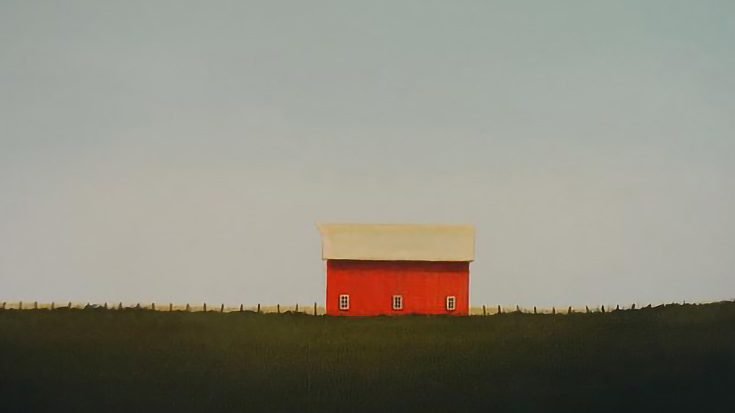
A PLACE
So I have sailed the seas and come…
to B…
a small town fastened to a field in Indiana. Twice there have been twelve hundred people here to answer to the census. The town is outstandingly neat and shady, and always puts its best side to the highway. On one lawn there’s even a wood or plastic iron deer.
You can reach us by crossing a creek. In the spring the lawns are green, the forsythia is singing, and even the railroad that guts the town has straight bright rails which hum when the train is coming, and the train itself has a welcome horning sound.
Down the back streets the asphalt crumbles into gravel. There’s Westbrook’s, with the geraniums, Horsefall’s, Mott’s. The sidewalk shatters. Gravel dust rises like breath behind the wagons. And I am in retirement from love.
WEATHER
In the Midwest, around the lower Lakes, the sky in the winter is heavy and close, and it is a rare day, a day to remark on, when the sky lifts and allows the heart up. I am keeping count, and as I write this page, it is eleven days since I have seen the sun.
MY HOUSE
There’s a row of headless maples behind my house, cut to free the passage of electrical wires. High stumps, ten feet tall, remain, and I climb these like a boy to watch the country sail away from me. They are ordinary fields, a little more uneven than they should be, since in the spring they puddle. The topsoil’s thin, but only moderately stony. Corn is grown one year, soybeans another. At dusk starlings darken the single tree—a larch—which stands in the middle. When the sky moves, fields move under it. I feel, on my perch, that I’ve lost my years. It’s as though I were living at last in my eyes, as I have always dreamed of doing, and I think then I know why I’ve come here: to see, and so to go out against new things—oh god how easily—like air in a breeze. It’s true there are moments—foolish moments, ecstasy on a tree stump—when I’m all but gone, scattered I like to think like seed, for I’m the sort now in the fool’s position of having love left over which I’d like to lose: what good is it now to me, candy ungiven after Halloween?
A PERSON
There are vacant lots on either side of Billy Holsclaw’s house. As the weather improves, they fill with hollyhocks. From spring through fall, Billy collects coal and wood and puts the lumps and pieces in piles near his door, for keeping warn in his one work. I see him most often on mild days sitting on his doorsill in the sun. I notice he’s squinting a little, which is perhaps the reason he doesn’t cackle as I pass. His house is the size of a single garage, and very old. It sheds its paint with its youth, and its boards are a warped and weathered gray. So is Billy. He wears a short lumpy faded black coat when it’s cold, otherwise he always goes about in the same loose, grease-spotted shirt and trousers. I suspect his galluses were yellow once, when they were new.
WIRES
These wires offend me. Three trees were maimed on their account, and now these wires deface the sky. They cross like a fence in front of me, enclosing the crows with the clouds. I can’t reach in, but like a stick, I throw my feelings over. What is it that offends me? I am on my stump, I’ve built a platform there, and the wires prevent my going out. The cut trees, the black wires, all the beyond birds therefore anger me. When I’ve wormed through a fence to reach a meadow, do I ever feel the same about the field?
THE CHURCH
The church has a steeple like the hat of a witch, and five birds, all doves, perch in its gutters.
MY HOUSE
Leaves move in the windows. I cannot tell you yet how beautiful it is, what it means. But they do move. They move in the glass.







